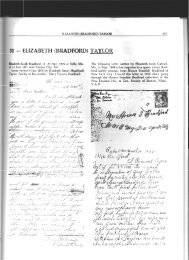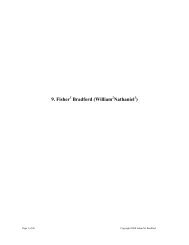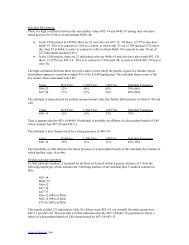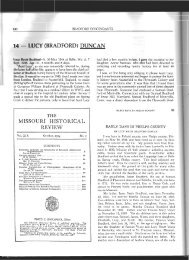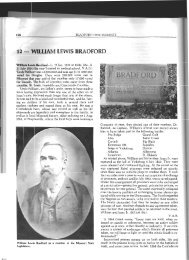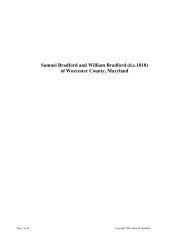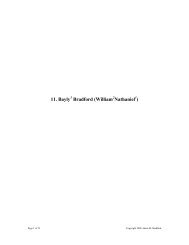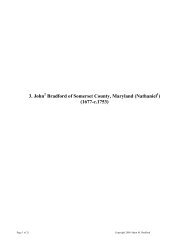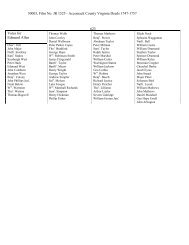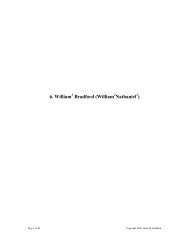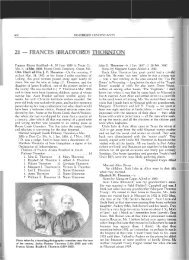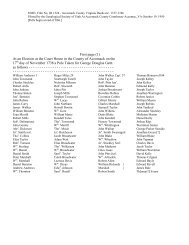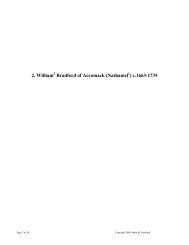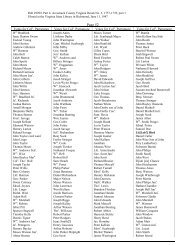1. Nathaniel Bradford of Accomack County, Virginia - Lower ...
1. Nathaniel Bradford of Accomack County, Virginia - Lower ...
1. Nathaniel Bradford of Accomack County, Virginia - Lower ...
You also want an ePaper? Increase the reach of your titles
YUMPU automatically turns print PDFs into web optimized ePapers that Google loves.
* * * * *<br />
Henry Smith<br />
In the year <strong>Nathaniel</strong> served on the grand jury and was appointed a representative <strong>of</strong> the county, all <strong>of</strong><br />
<strong>Accomack</strong> was witness to the trial <strong>of</strong> Henry Smith, who was brought before the court repeatedly for a series<br />
<strong>of</strong> alleged crimes, including beating his wife, raping two <strong>of</strong> his servants, starving and excessively beating<br />
other <strong>of</strong> his servants and even causing the death <strong>of</strong> one <strong>of</strong> them. The whole affair was particularly<br />
sensational due to the serious nature <strong>of</strong> Smith’s alleged misdeeds and the sheer number <strong>of</strong> them, but it is<br />
more than just a lurid tale. The Henry Smith affair was the first in a series <strong>of</strong> scandals on the eastern shore<br />
in what amounted to two years <strong>of</strong> social and political turmoil, even violence, that finally culminated in the<br />
dissolution <strong>of</strong> <strong>Accomack</strong> <strong>County</strong> and its reincorporation into Northampton <strong>County</strong> after less than a decade<br />
<strong>of</strong> existence.<br />
Henry Smith was a wealthy and well-connected planter who owned the 4300-acre plantation Oak Hall in<br />
the north <strong>of</strong> <strong>Accomack</strong>, as well as a plantation on Occahannock Creek not far from Richard Smith’s old<br />
plantation. He seems to have had some influence with the governor, who on a previous occasion allowed<br />
him to escape the normal course <strong>of</strong> justice in the matter <strong>of</strong> his killing <strong>of</strong> a neighbor’s livestock. 154<br />
Influence-peddling may seem bad enough, but Smith appeared guilty <strong>of</strong> far worse. Rumors <strong>of</strong> Henry<br />
Smith’s domestic tyranny were in circulation throughout the county even before June 1668, when his<br />
servant Jane Powell complained to Colonel Edmund Scarburgh <strong>of</strong> the severe whippings she suffered at her<br />
master’s hand. 155 Even though the Justices knew about Smith’s reputation for excessive cruelty, they sent<br />
him away with only a reprimand, since this was the first complaint against him. A few months later, in<br />
October 1668, Smith’s servant Elizabeth Carter was brought before the court on the charge <strong>of</strong> murdering<br />
her bastard child, since it had been found by two women who viewed it to be bruised about the head and its<br />
flesh peeled <strong>of</strong>f in places. 156 Elizabeth claimed that Henry Smith was the father, and her fellow servant Jane<br />
Hill testified that Smith “did frequently lie with [Elizabeth] and gave her physic,” presumably to prevent a<br />
pregnancy. In December there were more revelations, as several <strong>of</strong> Smith’s other servants as well as his<br />
wife came forward with their own complaints. The court was occupied with Smith’s trial for three days in<br />
early December <strong>of</strong> 1668, hearing the numerous accusations against him and attempting to determine what<br />
to do about his various alleged crimes. 157 Word <strong>of</strong> the Smith affair must have by this time spread<br />
throughout the entire county, so it’s safe to imagine that an even larger than usual crowd <strong>of</strong> residents<br />
gathered at Fowkes’ Tavern to view the proceedings.<br />
Though cleared <strong>of</strong> outright murder, Elizabeth Carter was found guilty <strong>of</strong> causing the death <strong>of</strong> her child and<br />
was fined and condemned to a public lashing. She accused Smith in writing <strong>of</strong> “tempting and alluring her to<br />
his bed by promise <strong>of</strong> marriage with other notorious and shameful imputations,” and declared that on some<br />
occasions Smith’s first wife’s sister, a Mrs. Holbrooke, would join them in bed. It also came out at trial that<br />
Smith had fathered a bastard child with another servant, Ann Cooper. Three other <strong>of</strong> Smith’s servants came<br />
forward to complain <strong>of</strong> severe beatings and <strong>of</strong> not being given enough food or clothing. Joanna Smith and<br />
others testified to the severe beatings her husband had given her. Believing Smith’s wife to be in danger,<br />
the court drew up Articles <strong>of</strong> Pacification, what today we would call a restraining order. Joanna pleaded for<br />
the court to take further action to secure her safety, since her husband had threatened to move to Maryland<br />
where he could engage in “more licentious living and liberty <strong>of</strong> using his tyranny to all under his power.”<br />
On top <strong>of</strong> all these revelations, it came out that Smith had publicly alleged the existence <strong>of</strong> a conspiracy<br />
against him on the part <strong>of</strong> the Justices and was known to have “said that the court had proceeded illegally<br />
and unjustly” and that he would “make them ashamed before the governor’s council.”<br />
In February 1669, more accusations against Smith surfaced. Smith’s servant Mary Hues accused him <strong>of</strong><br />
rape, which she described for the court in vivid detail. Even worse in the eyes <strong>of</strong> the court, Smith’s niece<br />
Rachel Moody testified that Smith had attempted to suborn perjury from her by forcing her to swear to a<br />
pre-prepared deposition denying all the complaints she had made against him. It also came out that Henry<br />
Smith’s servants Old John and Richard Webb had both died after a long period <strong>of</strong> ill treatment by him.<br />
Furthermore, the court declared that Smith had “the mark <strong>of</strong> God’s desertion by his pride and arrogance,” a<br />
reference to the recent drowning <strong>of</strong> some <strong>of</strong> his livestock as well as the burning down <strong>of</strong> his house, events<br />
that were viewed as judgments <strong>of</strong> God. On top <strong>of</strong> all this, it was made known that Smith had petitioned for<br />
an appeal to the governor against the proceedings <strong>of</strong> the <strong>Accomack</strong> <strong>County</strong> court in an effort to damage the<br />
Page 30 <strong>of</strong> 74 Copyright 2008 Adam M. <strong>Bradford</strong>



